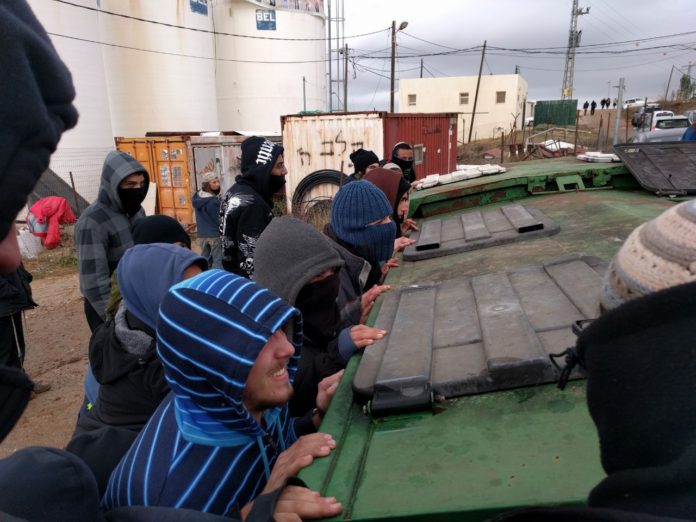

Reporter’s Notebook: No ‘tomorrow’ plans for Amona residents
AMONA – The tension on Avichai Boaron’s face leaves little to the imagination. Stepping into his spacious living room for a hastily-arranged press conference, his features are drawn tight, and there is deep worry in his eyes. As the spokesman for the residents’ committee here, Boaron has become a fixture in the Israeli media in recent weeks as the face of attempts to save the community from demolition. Now, the afternoon after residents rejected a government offer that Boaron described as “Swiss cheese,” he appears to be caught between the intellectual knowledge that the community’s days are numbered and the emotional inability to internalize that fact.
“I’m originally from Netanya, but were were one of the first couples to come here. We were a group of friends, after we were released from the army, and I heard about group that was founding a new yishuv (settlement community). My wife and I had just gotten married and it was just looking for,” Boaron told Tazpit Press Service (TPS).
Today, the clock ticks down to the High Court of Justice’s December 25 deadline for Amona’s demolition, Boaron says he has not made plans for the day after he and his seven children are removed from his home of 20 years.
“I swear to you it’s true,” he said. “I assume we’ll be put up in a girls seminary or something, but I really don’t know more than that. I can’t say more than that.”
A simple look around Boaron’s home illustrates his point. There are no moving boxes in the living room, kitchen or outside on the small porch – or anywhere else in the community. At several points, young mothers trailing small gaggles of children dot the hill, zipping jackets and adjusting fleece beanies on their heads to protect against the biting wind. Were it not for the hundreds of teenagers roaming the area, one could easily mistake the scene for a picture of normalcy.
But there is very little “normal” about Amona these days. With hundreds of Orthodox teenagers who have come to “defend the Land of Israel” roaming the area, the community feels decidedly a like a summer camp. On one building on the outskirts of the outpost, a group of boys hand planes of aluminum siding to another group on the roof, preparing a “last stand” against security forces that one person referred to as “their Alamo.”
One resident who would not give her name said her children, aged 11 and 9, have had trouble sleeping for several months, and find themselves caught between fears for the future, and especially about an unknown future.
“Of course we talk about it with the kids,” the woman said. “We talk about the value of the Land of Israel, about the reasons Hashem (God) brought us here at this time. It’s tough for them, like it’s tough for everybody. But I think they see our faith, our love for the land, and they learn how to be strong.”
Significantly, Avichai Boaron and other community leaders insist there will be no repeat of the 2006 riot that accompanied security forces’ demolition of nine permanent homes. Rabbi Yair Frank, the rabbi of Amona, noted that then, security forces were charged with using disproportionate force against teenage protesters, not protesters. Several young people said they would “passively” resist efforts to evict them from the site.
On the other hand, the potential for violence seems clear. On the road leading from Ofra, the parent settlement, to Amona, a group of teenagers roll tires, presumably to burn in protest when security forces arrive. Furthermore, apart from community residents, there are appear to be very few adults on site to calm tempers when the eviction begins. And the community motto – Amona Will Not Fall Again – conjures up images of Massada and Gamla – ancient sites where Jewish resistance groups preferred mass suicide rather than submission to foreign occupiers.
Asked whether community leaders learned anything from the Gush Katif experience – there, too, residents refused to prepare for eviction – Avichai Boaron said the community very much has learned lessons from the disengagement.
“Of course. We learned not to rely on promises – 11 years after the expulsion [from Gush Katif] how many people are still in caravelles [mobile homes]?
“Listen: There are solutions to the issue of Amona, if the politicians want to find them. But it’s hard for them to step out of their comfort zones in order to make a courageous move as leaders. But let’s be clear: Forcing people out of their homes in violence. Destroying a community is violence. If the government insists on carrying this all out, it is up to them to make preparations to absorb the families. That is their most basic responsibility,” Boaron said.





